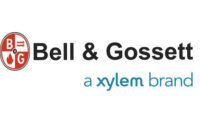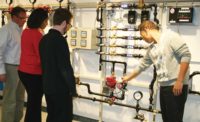Xylem Bell and Gossett’s Little Red Schoolhouse, a small building tucked away in suburban Chicago, has no plans to slow down as it enters its 62nd year of training engineers, contractors and manufacturers reps in the hydronic heating industry.
In 2015, the Little Red Schoolhouse hosted 20 seminars ranging from basic and advanced seminars on modern hydronic heating systems to large chilled water systems and steam system design and application courses.
Mark Handzel, Xylem’s vice president of regulatory affairs, explains the company’s forefathers understood in order for the hydronic heating and cooling market to establish itself, engineers would have to be properly trained on how to utilize these products.
“They developed the curriculum and it was not about the product,” he states. “It was about how these systems work and how do you design them to work most efficiently. Engineers do not come into the Schoolhouse to learn about Bell & Gossett product, they come here to learn how to design water-based HVAC systems.”
Handzel is proud that the Little Red Schoolhouse continues to meet the needed standards for accreditation as an authorized provider by the McLean, Va.-based International Association for Continuing Education and Training group. Having that recognition from IACET – which includes submitting coursework, problems and tests among other elements – ensures the students who trek to Chicago from all over the country are not left holding the bag on their CEU credits.
“IACET is an association that has ANSI standards you have to comply with in order to have your coursework certified,” he says. “Those IACET CEUs are accepted by all states across the United States. Maintaining that IACET certification has been one of our major focuses.
“A lot of people can say, ‘Hey, we will give you CEUs,’ but sometimes engineers get audited and the audits do not pass the mustard.”
Additionally, the Little Red Schoolhouse is approved by the Green Building Certification Institute to provide CEUs for LEED professionals. Handzel believes receiving that honor is crucial.
“It has almost become a standard in a new building that it will be LEED rated,” he says. “The GBCI credits have become just as popular because it is very rare to find a consulting engineer that doesn’t have a LEED certification.”
Handzel reports that classes for the consulting engineer remain the most-well-attended events at the Schoolhouse, but classes on service and maintenance of the pumps are on the rise. “We roll pumps out and have people take them apart and put them back together,” he explains.
Handzel sees a lot of what he calls “tribal knowledge” in the engineering field where the veteran designer knows how to design hydronic systems. However, a young professional might not have that knowledge and will see the benefit of a Schoolhouse course. “That’s where the thirst for knowledge is and where we see our greatest interest,” he says.
And the Little Red Schoolhouse has evolved in recent years to better reach its students. In January 2014, Xylem Bell & Gossett launched the Online Little Red Schoolhouse, which includes introductory courses on centrifugal pump fundamentals and piping systems.
“We understand it is difficult for companies to send people to Chicago for three days with the time and the expense,” Handzel says. “We have taken our content and put it into a professional management learning system that allows for someone to go to Schoolhouse classes at their desk.”
Currently, Xylem Bell & Gossett has two classes online and should have two more up this month. “When we look at our website and the visitors we get, we have people from around the world wanting our training,” Handzel says.
For more information on the Little Red Schoolhouse, visit www.bellgossett.com/training-education.
This article was originally titled “Old dog, new trick” in the December 2015 print edition of pme.





